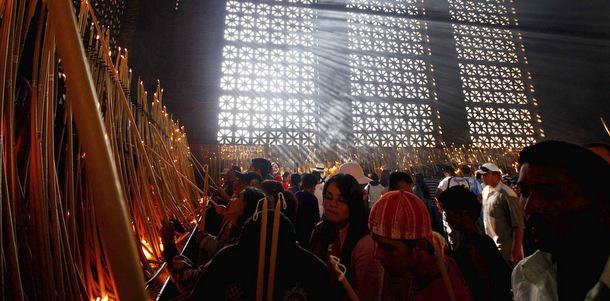Photo of the day - Christians in the world
Cheridan Sanders
Friday, August 3, 2012

For Christians are not distinct from other men in terms of their territories, their language, or their way of life....They live in the cities of the Greeks or the barbarians, as the lot has fallen to each one, and they adapt to the customs of the place in their clothing and food and in the rest of their way of living, offering the example of their marvelous form of social life, which all admit has something incredible about it. They live each in his own native land, but as if they were foreigners. They take their share in all the burdens, citizens, and they put up with everything, as strangers. Every foreign land is a native land for them, and every native land is a foreign land. They get married like everyone else and have children, but they do not expose their newborn children. They share their table, but not their bed. They live in the flesh, but not according to the flesh. They dwell on earth, but they are citizens of heaven. They obey the laws that have been laid down, but with their manner of life they rise above the laws. They love all and are persecuted by all....To put it in a word, Christians are in the world what the soul is in the body...The soul loves the flesh that hates it and loves its limbs: Christians, too, love those who hate them. The soul is shut up within the body, but it is the soul that sustains the body: Christians, too, are held in the world as in a prison, but it is they who sustain the world....God has assigned them such a high position, and they are not allowed to abandon it. Letter to DiognetusCNS photo
Related Articles:
Category: General Posts, Photo of the Day
Tag: Letter to Diognetus
Pray with the Pope Reflection – June 2025
Friday, June 13, 2025
 Fr. Edmund Lo, SJ
Fr. Edmund Lo, SJ
In this month of June, the Holy Father invites us to pray that the world might grow in compassion, that each one of us might find consolation in a personal relationship with Jesus, and from his Heart, learn to have compassion on the world.
Chaplaincy: “Divine Coffee” for Students
Tuesday, June 10, 2025
 Gianpaolo Capozzi
Gianpaolo Capozzi
Gianpaolo gives us a behind the scenes look at his upcoming Behold segment on the York University Catholic Chaplaincy.
Pope Leo XIV’s homily for Pentecost Sunday 2025
Sunday, June 8, 2025
 Pope Leo XIV
Pope Leo XIV
On Sunday, June 8, 2025, Pope Leo XIV celebrated Mass for the Jubilee of Movements, Associations, and New Communities and spoke about how the Holy Spirit helps the apostles overcome "their fear, shatters their inner chains, heals their wounds, anoints them with strength and grants them the courage to go out to all and to proclaim God’s mighty works."
Homily of Pope Leo XIV at the Mass for the Jubilee of Families, Children, Grandparents, and the Elderly
Sunday, June 1, 2025
 Pope Leo XIV
Pope Leo XIV
Pope Leo XIV celebrated Mass for the Jubilee of Families, Children, Grandparents, and the Elderly and referred to Pope Francis and mentioned spouses who have been beatified and canonized, like the parents of St. Therese of the Child Jesus.
Looking back on Rerum Novarum
Monday, May 26, 2025
 Matthew Neugebauer
Matthew Neugebauer
Pope Leo XIV chose his name primarily to highlight his most recent namesake Leo XIII, whose "historic encyclical Rerum Novarum addressed the social question" to the challenges of his time. What concerns does the encyclical address? How does it speak to its time? And what has been its legacy 134 years later?
SUPPORT LABEL
$50
$100
$150
$250
OTHER AMOUNT
DONATE













